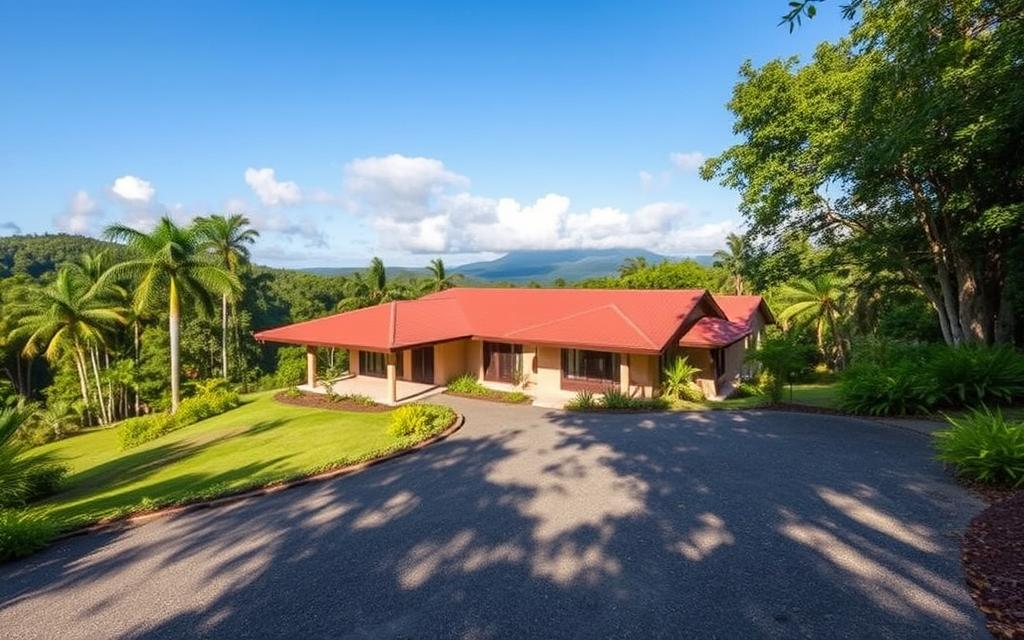Learn about application-refinance-loans-in-costa-rica with GAP Equity Loans. We offer competitive rates, lower fees, and flexible financing options for your investment property goals.

Is it Wise to Borrow Money in Costa Rica? We Explain
Costa Rica’s residential real estate market is booming, with international demand driving growth projected to reach over $334 billion USD by 2029. As a foreign investor, securing financing can be challenging, but alternative lending options are emerging.
We explore the complex landscape of borrowing money in Costa Rica, examining traditional and alternative financing options available to foreigners and residents. Costa Rica’s lending environment differs significantly from what North Americans and Europeans are accustomed to, making it crucial to understand the nuances before making financial commitments.
Our comprehensive guide will help you navigate various lending options, qualification requirements, and potential pitfalls when seeking financing in Costa Rica, including private lending and property loans.
The Reality of Borrowing Money in Costa Rica
Understanding the realities of lending in Costa Rica is crucial for potential borrowers. The country’s banking system and lending practices can be quite different from what foreigners are accustomed to.
Understanding the Costa Rican Banking System
The Costa Rican banking system is known for its stability, but it has become more restrictive since the 2008 global financial crisis. Private lending has become a significant option for foreigners. The banking system requires extensive documentation, and the approval process is often lengthy.
Why Traditional Financing is Challenging for Foreigners
Foreigners face several challenges when attempting to secure a loan in Costa Rica. The requirements for loan approval are stringent, including substantial down payments, often between 30% and 50% of the property’s value. Language barriers also play a significant role, as many banking documents are in Spanish. Moreover, applicants over 65 years old are likely to be declined due to age restrictions.
Some key challenges include extensive documentation requirements, language barriers, substantial down payments, age restrictions, and a slow approval process. These factors contribute to a challenging environment for foreigners seeking traditional financing in Costa Rica.
Is it Wise to Borrow Money in Costa Rica? Factors to Consider
When considering borrowing money in Costa Rica, several factors come into play that can significantly impact your financial decision. The Costa Rican lending market offers various options for financing property, but it’s crucial to weigh the benefits against the potential risks.
Benefits of Financing Property in Costa Rica
Financing property in Costa Rica can be a viable option for those looking to invest in the local market. Private lending and owner financing are available, offering interest rates between 6% and 10%. With private banks typically offering interest rates between 8.5% and 10%, and owner financing sometimes being more competitive, there are opportunities to secure loans that fit different financial situations.
One of the benefits is that financing allows you to invest in Costa Rica’s property market with potentially lower upfront costs. This can be particularly appealing for foreigners looking to invest in the country’s growing tourism and real estate sectors.

Potential Risks and Challenges
Despite the benefits, there are several risks and challenges associated with borrowing money in Costa Rica. Interest rates are significantly higher than in North America and Europe, and currency fluctuations can impact loan repayments. For instance, loans denominated in colones may be subject to devaluation against the dollar.
Other challenges include the legal framework for foreclosure, which differs from North American systems, potentially creating complications if financial difficulties arise. Additionally, transaction costs are substantial, with closing costs typically running 3-4% of the purchase price, plus additional fees for setting up mortgages. The seasonal nature of rental income in tourist areas can also create cash flow challenges during the low season.
Traditional Bank Loans in Costa Rica
In Costa Rica, traditional bank loans offer a viable pathway to securing property or financing ventures. These loans are particularly attractive due to their structured repayment terms and competitive interest rates compared to other forms of lending.
Qualification Requirements for Foreigners
Foreigners seeking traditional bank loans in Costa Rica face stricter qualification requirements. Typically, a large down payment, ranging between 30% and 50% of the property value, is required. Additionally, a strong credit history is essential for loan approval.
- Large down payment (30-50%)
- Strong credit history
- Potential need for local guarantors or collateral
Interest Rates and Terms
Interest rates for traditional bank loans in Costa Rica are significantly higher than those in North America and Europe, typically ranging from 8.5% to 12%. Loan terms can extend up to 30 years for qualified borrowers, although foreigners are often limited to shorter terms of 15-20 years.
- Interest rates: 8.5% to 12%
- Loan terms: up to 30 years
- Variable interest rates are common
Alternative Financing Options for Property in Costa Rica
Financing a property in Costa Rica can be achieved through multiple alternative channels. While traditional banking systems can be challenging, especially for foreigners, alternative financing options provide viable solutions.

Owner and Developer Financing
One alternative is owner and developer financing, where the seller or developer provides financing to the buyer. This method can be beneficial as it often involves more flexible terms than traditional loans.
For instance, developers may offer financing plans that allow buyers to pay in installments, making it easier to purchase property.
International Lenders and Self-Directed IRAs
International lenders offer another financing avenue, providing loans to buyers in Costa Rica. Additionally, self-directed IRAs can be used to invest in Costa Rican property, allowing buyers to utilize their retirement funds.
- International lenders provide loans with competitive interest rates.
- Self-directed IRAs enable investment in foreign property.
- These options provide more flexibility for buyers.
Equity Lines of Credit from Your Home Country
Using an equity line of credit from your home country is a straightforward financing solution. Many buyers tap into their home equity to purchase property in Costa Rica.
This approach leverages existing equity, often at lower interest rates than local financing options. The application process is also simplified, as it occurs in the buyer’s home country.
Funds obtained can be used for a cash purchase, strengthening the buyer’s negotiating position.
Home Equity Loans in Costa Rica
For those looking to leverage their Costa Rican property, home equity loans present a practical solution. Home equity loans allow property owners to use their existing property as collateral to secure a loan, providing access to capital without having to sell their investment.
How Home Equity Loans Work
Home equity loans work by allowing lenders to provide a loan based on the equity available in your Costa Rican property. The loan amount is determined by the property’s value, and the loan is secured by a mortgage on the property.
This method simplifies the lending process, as the property’s value is a significant factor in determining loan approval.
Benefits of Using Your Property as Collateral
Using your property as collateral for a home equity loan offers several benefits, including:
- Using your Costa Rican property as collateral often results in faster approval times compared to traditional loans.
- Qualification requirements focus more on the property’s value than the borrower’s credit history.
- These loans provide access to significant capital without selling the property.
- The funds obtained can be used for various purposes, including additional property investments or personal expenses.
- Home equity loans typically involve fewer upfront fees than traditional mortgages.
- The collateralized nature of these loans often results in more competitive interest rates.
- For property owners facing temporary cash flow challenges, these loans provide a solution that preserves their long-term investment.
GAP Equity Loans: A Flexible Financing Solution

GAP Equity Loans provide a flexible financing option for individuals in Costa Rica. By using your Costa Rican property as collateral, you can borrow money ranging from $50,000 to $1,000,000. This type of loan is particularly beneficial for those who need significant funds but may not qualify for traditional bank loans.
Who Qualifies for GAP Equity Loans
The qualification process for GAP Equity Loans is relatively straightforward. Borrowers need to have a clear title to their property and sufficient equity to secure the loan. GAP Equity Loans in Costa Rica are available to various individuals, including foreigners, provided they meet the basic criteria. The loan-to-value ratio, property condition, and borrower’s creditworthiness are considered during the approval process.
Loan Terms and Interest Rates
GAP Equity Loans offer flexible terms, with loan durations ranging from 6 months to 3 years. Interest rates start at 12% and can vary based on the loan-to-value ratio, property location, and other risk factors. These loans provide borrowers with the flexibility to choose between interest-only payments with a balloon payment at maturity or other repayment options. The application and approval process is typically faster than traditional bank financing, often completing within weeks.
The Application Process for Borrowing in Costa Rica
The application process for borrowing in Costa Rica can be complex, but knowing what to expect can simplify it. We will guide you through the necessary steps and timelines involved in securing a loan. Understanding this process is key to a successful borrowing experience.
Required Documentation
To initiate the lending process in Costa Rica, borrowers must provide specific documentation. This typically includes identification, proof of income, and property details if applicable. Ensuring that all documents are in order can expedite the approval process.
Timeline and Expectations
The timeline for loan approval in Costa Rica varies between traditional banks and private lenders like GAP Equity Loans. Traditional bank financing can take 2-3 months, while private lending is often completed in 2-4 weeks. The process involves an initial consultation, property appraisal, document verification, loan approval, and closing.
- The initial consultation determines eligibility and loan options.
- Property appraisal typically takes 1-2 weeks.
- Document verification and due diligence require 1-2 weeks.
- Loan approval and legal document drafting take about 1 week with private lenders.
Making Smart Borrowing Decisions in Costa Rica
For investors and borrowers alike, understanding the lending landscape in Costa Rica is key. We connect borrowers with private investors and lenders, providing competitive rates, lower fees, and flexible financing options compared to traditional banks. When borrowing in Costa Rica, it’s essential to be aware of the potential risks and benefits associated with different lending options.
To ensure a well-informed decision, consider the following factors before taking a loan: Is it safe to borrow money in Costa Rica. Understanding the terms and conditions of your loan is crucial.
Questions to Ask Before Taking a Loan
Before committing to a loan, several questions should be asked to clarify the terms and conditions. These include:
- What are the interest rates and fees associated with the loan?
- What is the repayment schedule, and are there any penalties for early repayment?
- How does the lender handle defaults or late payments?
Red Flags to Watch For
When dealing with lenders, certain red flags should be monitored closely. These include:
- Unusually low interest rates may indicate hidden fees.
- Pressure to make quick decisions without adequate review time.
- Lack of clear, written terms or reluctance to answer specific questions.
- Requests for large upfront fees before loan approval.
Conclusion: Is Borrowing Money in Costa Rica Right for You?
Our analysis of borrowing money in Costa Rica reveals that while traditional financing paths can be restrictive, alternative options like GAP Equity Loans offer promising avenues for property investment. Borrowing can be a viable strategy for expats and investors, provided they carefully assess their financial situation and investment goals.
With the right approach and partners, borrowing in Costa Rica can be a powerful tool for achieving investment goals in this growing real estate market.
Article by Glenn Tellier (Founder of CRIE and Grupo Gap)



